
By: Ellie (Elena) Martinez 2023
I don’t have a picture of the murderer, though his eyes followed me and my teenage daughter as we walked alone down the vacant beach. The breaking surf that churned through the air on our left muffled the sharp tone of the surf instructor’s whistle behind us. The whistle was encouragement and instruction for the handful of newcomers, including my son, to stand and ride their first wave. The man who stood watching us walking away from early morning surfing class wore an ominous expression that belied the cheery nature of the brightly colored flags and painted surfboards that filled the wooden surf shack behind him. Unease trickled its way through my veins. I looked at my daughter and told her not to make eye contact with the man. She complied, but her eyes questioned my own. We continued our solitary walk down to the end of the beach, snapping photos of the deep blues of the bay waters contrasting with the abandoned and salt-worn buildings shuttered and closed along the beach. Returning to the class, I saw my husband sitting on a cement barrier wall in front of the surf shack. I told him I thought it made for a great photo but also confessed in a hushed tone that because of his angle, the photograph would not include the man who had made me uneasy and who still stood with arms crossed watching us. Relieved by my manufactured omission, I snapped a photo for our family album.
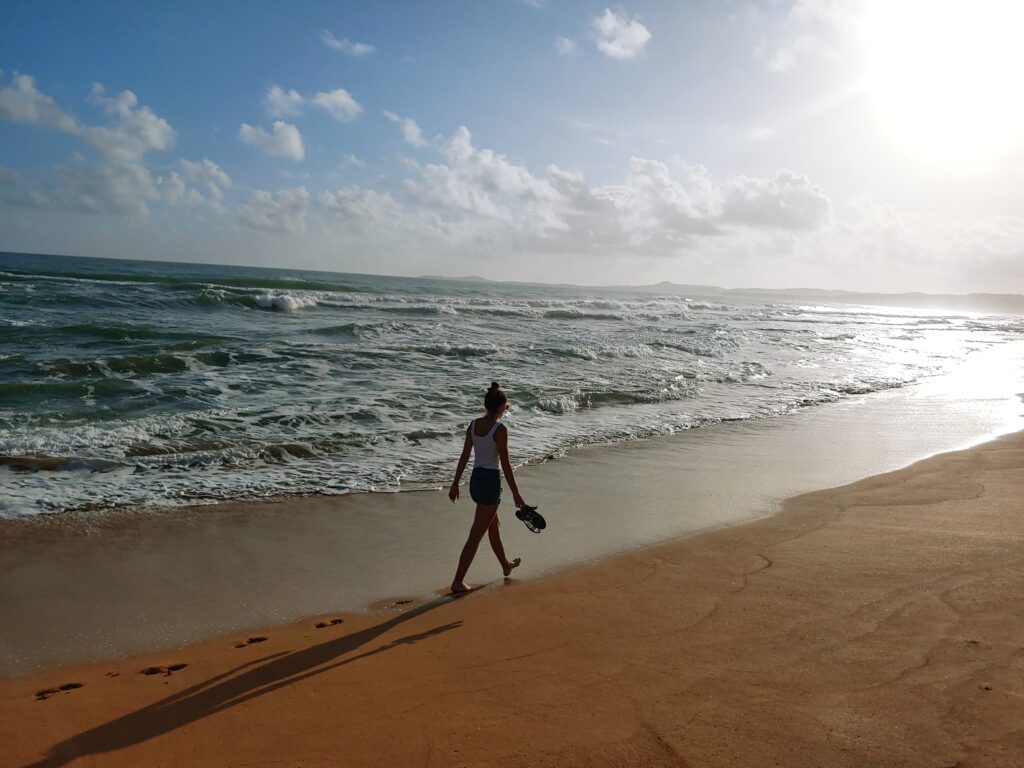

shack where Jesús Bonano Laureano stood.
We had only been on the island of Puerto Rico for a day. Our family of four headed to the lush Caribbean Island as an antidote to the dry and empty spaces of our Colorado hometown. It was mid-pandemic, and while around the world tourist areas were void, like the beach we strolled, something seemed different about the empty space in this place. Along the streets and hilltops that were crowded with what seemed like abandoned buildings, evidence of Hurricane Maria, some three years on at that point, still scarred the landscape. The empty spaces created by either the pandemic, hurricane, or both, formed an audible pause. Like a song played from sheet music cut off between the turning of pages.
Most of our family in the United States didn’t even know we were visiting the US Territory. There was a significant pressure to not travel. Yet, travel was a necessary and profound family bonding experience for my husband and our two teenage children. The prior year had seen many planned trips canceled. Stress levels were high, and we were stir-crazy after months in the house alone. We determined a responsible path – we tested negative, we masked, we booked a single-family apartment with a balcony overlooking the beach, and intended to isolate ourselves in nature, or at least with a good view.

Puerto Rico is an island territory of the United States situated at the gate of the Caribbean, some 1,000 miles from mainland Florida. It was named by colonizing Spaniards for the “rich port” it had in the deep waters of the Bahia de San Juan. While neighboring islands were flush with minerals or agricultural land that produced a crop of gold for eager European interests, Puerto Rico’s size and rugged mountainous landscape were harder to tame. It turned out that the most prized resource it gave was its port and its position within the Caribbean at the precise end of the Atlantic trade winds.
The United States acquired the island after the Spanish-American War and since has managed it like a storybook stepchild; part of the family, yet never welcomed. As a commonwealth to the United States, it has earned some protection from the head of the family, yet ultimately, not enough attention has been given to it to establish it confidently in a seat at the table. This dismissal has instead caused generations of immigration waves to the mainland as people seek a way to put food on their own tables.
In 2017, a Category 5 Hurricane innocently named Maria struck Puerto Rico with devastating force, sweeping the already precarious situation of the island into total disarray. Nearly 3,000 people were killed, and fundamental infrastructure was demolished. Scenes of destruction filled the news channels, yet, as we had for the previous 120 years, most Americans, from those on small-town streets to one at Pennsylvania Avenue, seemed either not to care or recognize that this was a part of the United States deserving of reaction and protection. In a literal one-two sucker punch, Maria hit the island just two weeks after it was also hit by another Category 5 hurricane whose name many have forgotten amidst the jumble of hurricanes that year – Irma. Rebuilding with damaged infrastructure and limited aid was and will take more time, even five years later. But in a particularly cruel turn of the cards, that progress was further hampered by COVID-19 just two years later, which shut much of the world down.
I first spoke to Brian the morning after we arrived in Luquillo. He answered on the first ring, surprising me with his eager energy in a town seemingly asleep. I asked about surfing lessons for my son, wanting to schedule them around our other activities in the week ahead. Our phone call lasted 30 minutes as it turned into a conversation about our family’s reasons for visiting the island, why my son wanted to surf, his athletic abilities, Brian’s philosophy of surfing, where he grew up, his pride in his family and young children, and finally a laugh at how I had a very Spanish name but didn’t speak Spanish. With a smile that I could hear, he said, “We all have beautiful stories to tell.” I hung up, walked back from the balcony into the apartment, and announced to my family that it was the most meaningful conversation I’ve ever had with a stranger in my entire life.
Early the next morning, we met for the surfing class at Luquillo Beach, a narrow cove that created sizable waves within reach for beginners. A couple of other students milled about on the beach and sidewalk as a moving truck with images of surfers beneath a Puerto Rican flag pulled into the area. Brian jumped out of the truck and walked brightly towards us, his eyes sparkling beneath his darkly tanned skin with a smile as bright as the sun-kissed waves behind him as he introduced himself. Looking at my son, he said, “You’ll surf today, my friend.” A short 30 minutes later, after an orientation on the boards in the sand, in which Brian shepherded his students into the waves with encouraging shouts and instructive whistles, my son surfed his first wave. After the lesson (and our stroll up the beach), conversation and experiences flowed from each of us as if we were old friends reacquainting ourselves. Brian shared his concern that there were very strong undertows at this surfing beach and if you didn’t know what you were doing or with an experienced guide, things could get dangerous. He tossed his head in the direction of the wooden surf shack up the beach and complained that business owners who just let tourists surf here with rented boards put them at risk. “I’ve had to rescue too many people who surf from the boards he rents because they are unprepared for the currents and pressures of the bay. It’s upsetting,” Brian said. Wrapping up to get on our day’s itinerary, we confirmed our plans for lessons the next morning. Brian continued talking to us and asked about our touring plans for the rest of the day. He told us of hiking in El Yunque and the beautiful island of Culebra, drawing out the pronunciation of the island off the coast of Puerto Rico with a Spanish lilt that accentuated the e, making it sound even more inviting. His last words to me that day were, “Call me to let me know what you’re doing.” I laughed and said, “Well, I don’t want to disturb you; I know you are busy enough without hearing about us.” He said, “But I want you to. Please call me. I love to talk to people, and I always answer my calls.”
We spent the day driving through the El Yunque Rainforest. Having it practically to ourselves, we explored lush trails to hidden waterfalls, stopped at roadside shops, and hiked up to the Bretton Observation Tower to marvel at the vista of lush green treetops expanding out to the blue ocean in all directions. At 7:30 am the next morning, we were at the beach. Again, it was deserted. Brian’s truck was not there. I called him, wondering if he may have changed the time of the lesson. I got his voicemail, and I left a message. Ten minutes went by and still, Brian wasn’t there. I called again, and the call went to voicemail. I recalled his words to me the day before, “I always answer my calls.” I wondered, suddenly worried, what had happened. Up ahead, I noticed a young woman walking towards us. She asked us if we were waiting for Brian. I said, yes, explaining that we had lessons planned with him this morning. I noticed her eyes were red as she coughed out between tears, “he died yesterday”. Behind me, my son and daughter shouted, “Oh my god, WHAT?” while my mind began breaking down her vocabulary to process it. Died. What does that mean? He was too young and seemingly fit to die from health concerns. He was an expert at surfing so he couldn’t have drowned. Something else must have happened to…oh no I then surmised, “In a car accident?” Through tears, she shook her head, still sobbing, then rephrased it more precisely, “He was murdered here on the street by the man who runs that surfing rental shack.” My eyes traveled in the direction of her pointing finger where I saw the brightly colored wooden structure and in my memory the man with the ominous look on his face watching us. The air hung empty between us, now dry and hollow, as we stood in silence.
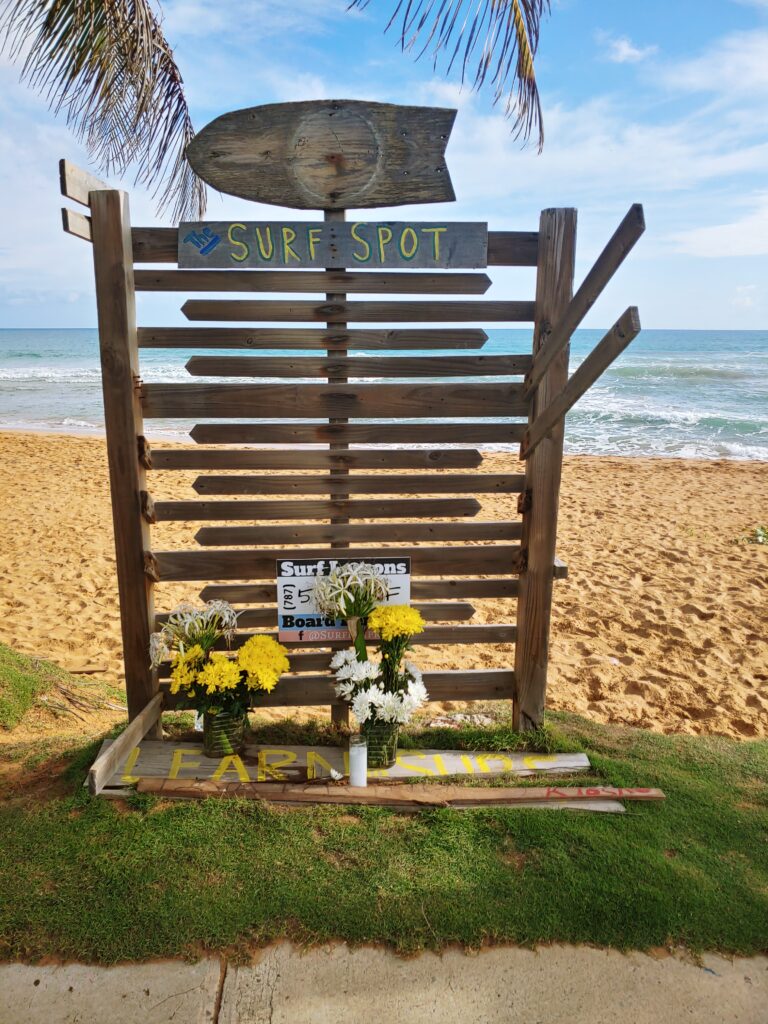
The days after Brian’s murder were filled with activities that distracted us as we each individually processed our grief for a life lost that we barely knew. Despite this brevity, or compelled by it, I sought to understand this beautiful island and its people bound by the twin forces of the human condition: hope, and strife. The contrasts of these emotions painted themselves in the landscapes, neighborhoods, monuments, and people throughout the island. We drove through mountain towns where people gathered to sit on overturned buckets alongside a road scarred with boulder-sized potholes in front of a lush mountain valley full of flowers and greenery. We walked through the grounds of El Morro, seeking shelter in a 250-year-old nook when the dark clouds of an approaching storm over the ocean cast a shimmering golden light over the sea and landscape. We paddled through the inky black darkness of an estuary at night only to be awed by the dancing light of thousands of bioluminescent dinoflagellates. Looking out our high-rise balcony at the emp curfew-bound streets of COVID, we watched a masked man on a motorcycle ride slowly around the neighborhood playing Latin music for all to hear. Everywhere we looked we saw something beautiful sitting side by side with struggle and strife.

La Pared Beach, Puerto Rico
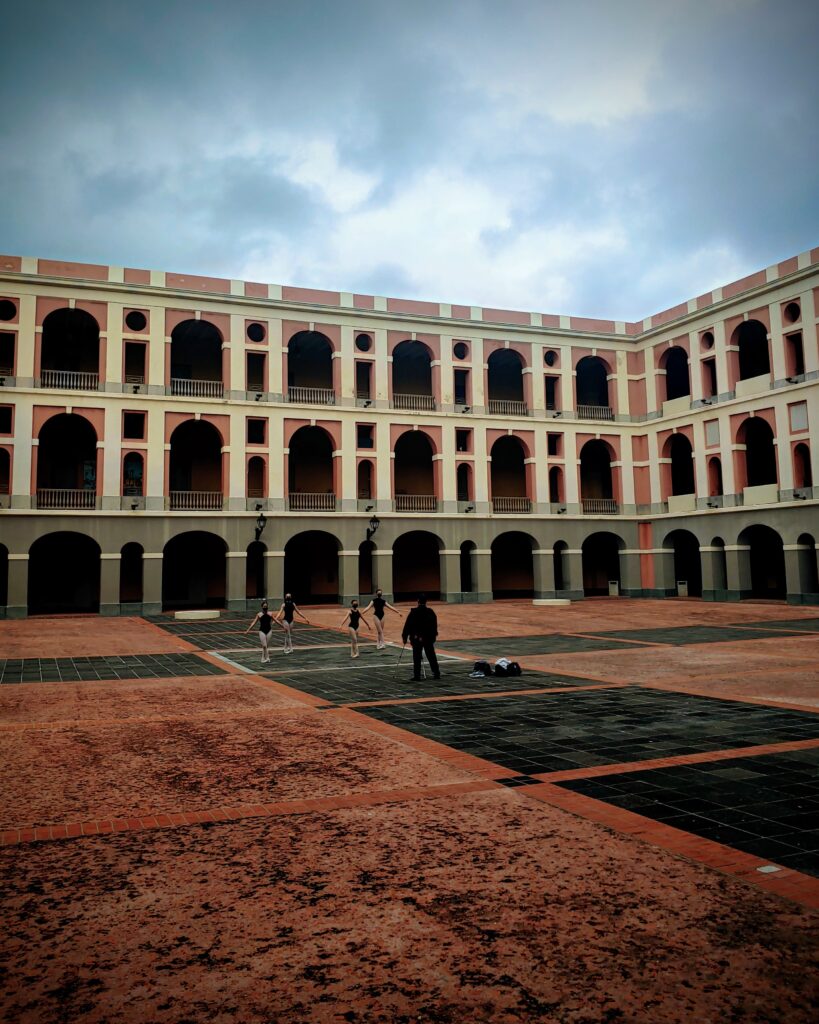
Old Barracks, San Juan
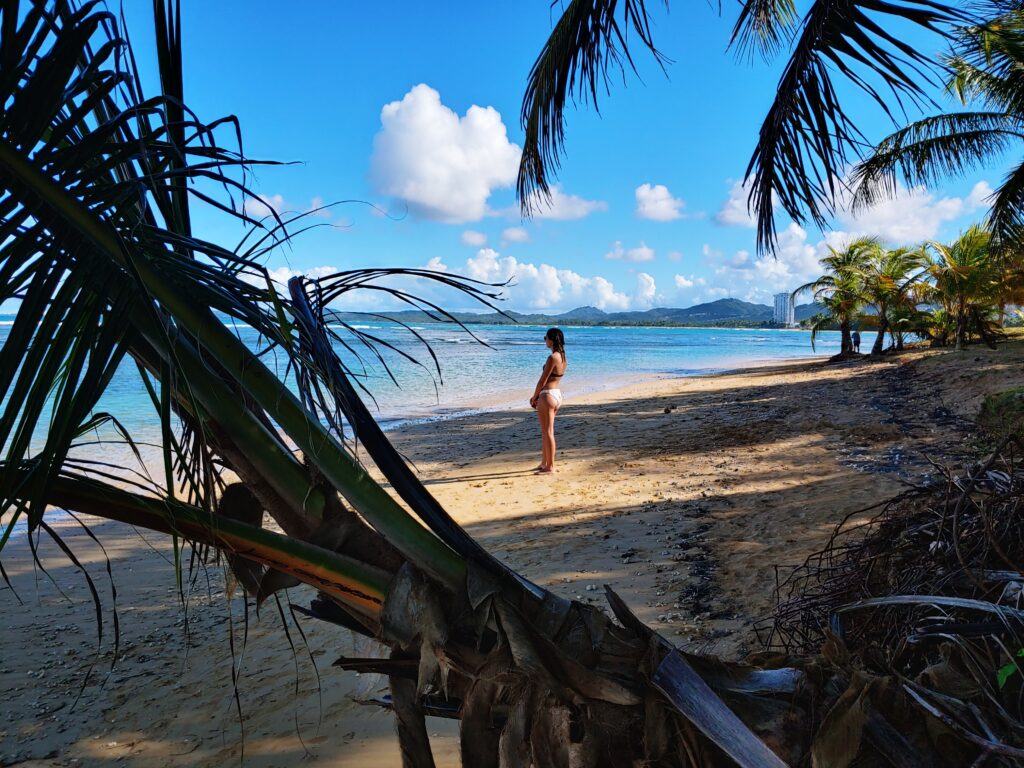
Luquillo, Puerto Rico

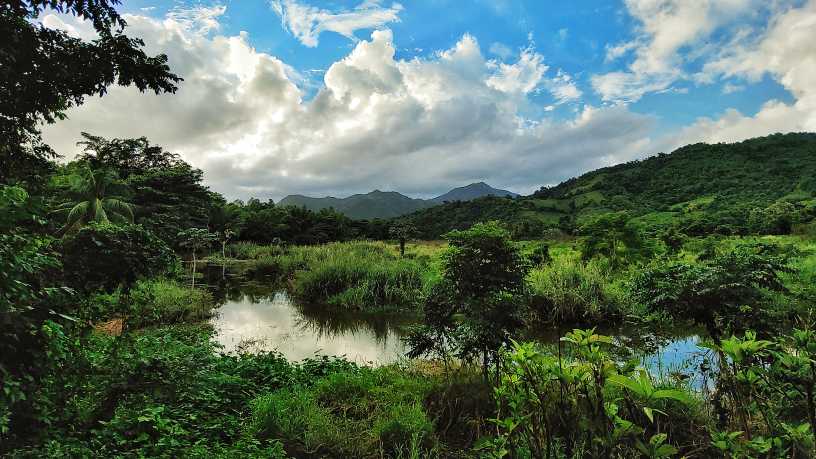
Brian Ramos Torres was murdered after being struck multiple times with a baseball bat from Jesús Bonano Laureano, who operated a surfing stand at the same beach that Brian had for years taught hundreds of children to surf for the first time. Brian told us himself that he had on multiple occasions saved people from the strong surf at La Pared beach. I wasn’t there when it happened, but others who were had told me that the afternoon after we had left with his appeal to call him, Brian had to rescue other swimmers and went to tell Laureano that he needed to be more careful in warning people about the dangers of the bay. As he turned to walk back to his surfing class, Laureano went behind his shack, pulled out his baseball bat, and struck Brian in the back of the head, killing him.
One night at 2 am, I awoke to the sound of the crashing waves, continuing their work to shape this land and I pondered the continuity of our world in which surf can crash against the rocks ceaselessly while people, with lives as rich and full as Brian’s can come and go. I couldn’t sleep. The makeshift memorial that had started with a few flowers and mementos from those of us who first heard of his death grew every day at La Pared Beach. Neighbors, friends, and family gathered each evening to talk and to share their experiences and memories of Brian. Each night we went back to the beach to see, to share, and to honor a man we had only known for a day. Having grown up on this island, traveled the world on a professional surfing circuit, and having taught hundreds to surf through his school, his reach in this world extended far beyond the beach he called home.
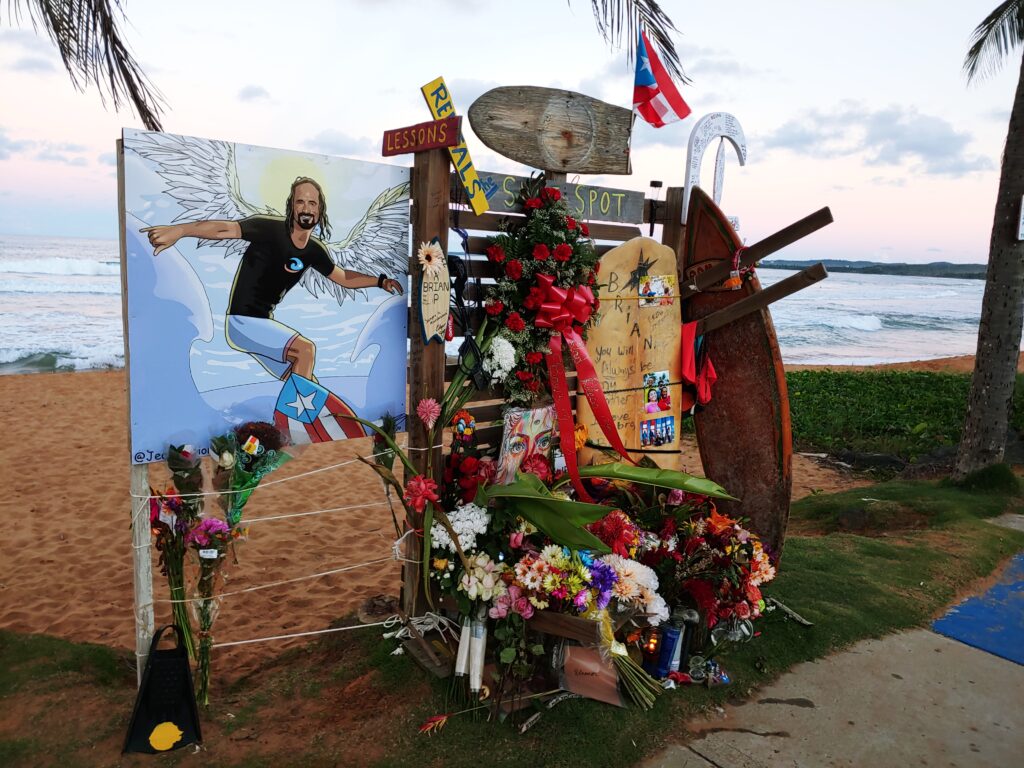
One afternoon, all four of us went down to the bay in front of our rental apartment for a swim. The deep rolling waves tossed us around in their mirth, and I looked back at the palms swaying in the wind as the rugged mountains rising from the island were slowly engulfed in clouds. Raindrops began to drop onto the water, creating splashes across the bay. My initial thought was to head to shore and out of the rain, but we lingered, none of us wanting to go. We stayed swimming in the waters as the rainstorm fell around us, blurring the line between water and shore, between rain and tears, between serenity and violence. It was a moment I will likely never forget, and Brian’s words came back to me – we all have beautiful stories to tell.
